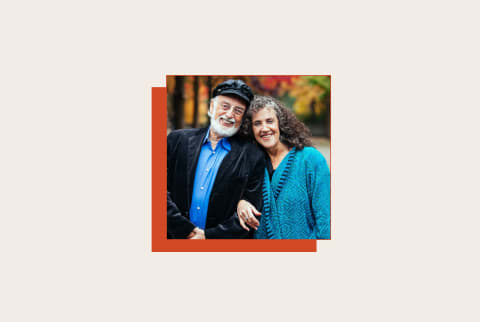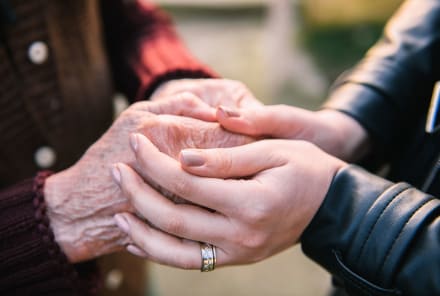Advertisement
3 Little Things You Can Do On A Daily Basis For A Successful Relationship


Every relationship is different, but when experts with over 20 years of research share their tips to secure a successful partnership, chances are you'll learn something valuable. Such is the case with psychologists John Gottman, Ph.D., and Julie Gottman, Ph.D., authors of The Love Prescription and founders of the Gottman Institute: The husband and wife duo can predict the success of a relationship within 15 minutes of observing the couple's behavior—and on this episode of the mindbodygreen podcast, they offer their tried-and-true tips to ensure everlasting love.
Below, find three daily habits that can strengthen your relationship over time. Sometimes the tiniest tweaks can make the biggest difference.
Turn toward.
How do you respond to your partner? Do you ignore them (turn away), or do you engage (turn toward)? The Gottmans wanted to assess these patterns, so they created an apartment lab and studied couples who stayed there for 24 hours. "One of the most powerful things that we discovered in our apartment lab was that people were always reaching out for connections," says John. "They're making bids for conversation, for touch, for affection quite often, and the reaction of the partner is so critical."
Namely, they found couples who wound up divorcing seven years after their wedding had only turned toward their partner's bids for connection 33% of the time. "Whereas the couples who were still married (prior, six years ago) had turned toward those bids 86% of the time. So these small moments are very, very, powerful," John adds.
What does a bid for connection look like, you ask? Well, it can be something as simple as: "Honey, look at that blue bird outside. Is that a blue jay?" If you ignore their observation completely, that's turning away; if you respond with shared interest, that's turning toward. "And that makes all the difference in the quality of friendship, the quality of passion and romance in the relationship, as well as conflict," says Julie. "[Bids for connection] can be tiny, they can be big, but the important thing is the tiny ones are just as important to keep fulfilling as the big ones."
Give compliments.
Compliments shouldn't end at courtship. Many people might think that when you're in a secure, loving relationship, you don't need reassurance from your partner anymore—but according to Julie, that could not be more false. "We continue to need a little bit of reassurance that we're lovable, that we're worthy, that we're enough for our partners... I've never met somebody who actually had surpassed their need for compliments."
In fact, she references a study in which researchers observed couples in their homes for an evening and counted the number of positive interactions that happened between them. The results? Couples in unhappy marriages underestimated the number of positive interactions in their marriage by 50%1. "When you say thank you, when you pay a compliment to your partner, you're building this culture of appreciation in the relationship that is such a cushion for dealing with the world's everyday stresses," affirms John. "It's just very powerful."
Physical touch.
Touch is essential for healthy relationships, according to the Gottmans (even if physical touch isn't your love language). That doesn't mean you have to engage in some sweeping gesture every time you're out in public, but touch is an important part of connection. In fact, "touch is as essential to our well-being as food, water, and exercise," says Julie.
Think about it: Humans are social beings, and we depend on each other in order to survive. It's why extreme loneliness is associated with a greater mortality risk2. "And part of that connection that we need for our survival is touch," Julie adds.
John references the classic study by psychologist Harry Harlow, Ph.D.3, where researchers gave baby monkeys a wire "mother" that provided milk and a cloth "mother" that provided contact comfort in their cage. When those baby monkeys became frightened, they ran straight toward that cloth mother. "So there's a basic drive in all mammals for a connection, and touch is a part of that," John says.
And again, it doesn't even have to be a sexual or intimate touch. "It can be just a touch on the arm, a touch on the shoulder, holding hands…whatever it is, but touch makes a gigantic difference in relationships," adds Julie.
The takeaway.
You don't have to perform grand romantic gestures to secure long-lasting love. According to the Gottmans, small, everyday habits tend to have bigger impacts on the relationship over time. All of these tips take less than five seconds to practice—an interested response, a genuine compliment, a touch on the shoulder—but they can influence your partnership in a major way.
We hope you enjoy this episode! And don't forget to subscribe to our podcast on iTunes, Google Podcasts, Spotify, or Amazon Music!
Watch Next
Enjoy some of our favorite clips from classes
Enjoy some of our favorite clips from classes
What Is Meditation?
Mindfulness/Spirituality | Light Watkins
Box Breathing
Mindfulness/Spirituality | Gwen Dittmar
What Breathwork Can Address
Mindfulness/Spirituality | Gwen Dittmar
The 8 Limbs of Yoga - What is Asana?
Yoga | Caley Alyssa
Two Standing Postures to Open Up Tight Hips
Yoga | Caley Alyssa
How Plants Can Optimize Athletic Performance
Nutrition | Rich Roll
What to Eat Before a Workout
Nutrition | Rich Roll
How Ayurveda Helps Us Navigate Modern Life
Nutrition | Sahara Rose
Messages About Love & Relationships
Love & Relationships | Esther Perel
Love Languages
Love & Relationships | Esther Perel
What Is Meditation?
Box Breathing
What Breathwork Can Address
The 8 Limbs of Yoga - What is Asana?
Two Standing Postures to Open Up Tight Hips
How Plants Can Optimize Athletic Performance
What to Eat Before a Workout
How Ayurveda Helps Us Navigate Modern Life
Messages About Love & Relationships
Love Languages
Advertisement

The 4 Pillars That Lead To Long-Lasting Relationships, From A Marriage Counselor
Rachel Glik, Ed.D., LPC

The 4 Pillars That Lead To Long-Lasting Relationships, From A Marriage Counselor
Rachel Glik, Ed.D., LPC









